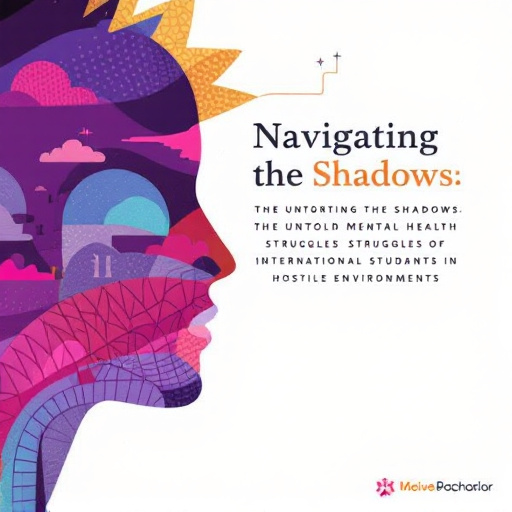Featured Articles
- "Ghosting the Globe: The Rise of International Students' Invisible Struggles in Mental Health Support"
- Navigating Cultural Shock: How International Students Are Redefining Home Away from Home in Unlikely Places
- Navigating Cultural Shock: The Hidden Mental Health Crisis Among International Students in a Post-Pandemic World
- Navigating the Shadows: The Untold Mental Health Struggles of International Students in Hostile Environments
- Navigating the Unknown: How International Students Are Shaping Local Cultures and Communities in Unexpected Ways
Navigating the Shadows: The Untold Mental Health Struggles of International Students in Hostile Environments
Navigating the Shadows: The Untold Mental Health Struggles of International Students in Hostile Environments
The mental health struggles of international students residing in hostile environments are often overlooked. This article delves into their untold challenges, revealing personal stories and statistics while advocating for greater understanding and support from host communities.
Understanding Hostility
For many international students, the transition from home to a foreign land can feel like stepping onto a different planet, complete with alien customs and culture shock. In certain environments, especially those marked by political tension or social unease, students may also confront open hostility or prejudice, which exacerbates their mental health struggles.
The Statistics That Matter
According to a 2022 study by the World Health Organization, around 30% of international students reported experiencing significant mental health challenges, compared to about 14% of domestic students. This disparity is troubling, highlighting that international students are at a higher risk of mental health issues due to various stressors, including adaptation difficulties, and social isolation (Kebede et al., 2023).
A Day in the Life
Meet Anand, a 22-year-old student from India studying computer science in a university in the UK. Walking to class each day, he dons a brave face, but inside, he battles feelings of loneliness and anxiety. He recalls his first week there: “I was physically present, yet I felt invisible. I couldn’t find anyone who understood my culture or struggles.”
Personal Stories of Resilience
Anand’s journey isn’t unique. Many international students find comfort in shared experiences. In a recent online forum, Lucy, a Vietnamese student studying in Australia, shared her story. “I faced discrimination at my part-time job, which took a toll on my mental health. It made me question my worth and contributions.” Listening to each other's tales can provide solace and a sense of community, further emphasizing the importance of support networks.
Institutional Barriers
Institutions often have inadequate resources for mental health support tailored to the unique needs of international students. A study from 2023 showed that only 18% of universities offered specialized mental health services for this demographic. As institutions increasingly welcome international students, many fail to provide adequate support structures, leaving students feeling abandoned or lost in their host cultures.
Humor as a Coping Mechanism
As they navigate the trials of academic life and cultural differences, some international students find solace—and a means of coping—through humor. Comedian and international student participant, Rashid, recalls, “If you can’t laugh about being asked to pronounce your name three times, you might as well cry!” This lighthearted perspective can provide temporary relief and foster connections among students.
Culture Shock and its Impact
Culture shock can dramatically affect a student's mental well-being. Many students arrive expecting a liberal and welcoming environment, only to encounter cultural barriers that leave them feeling alienated. Statistics show that 38% of international students cite adapting to cultural differences as a significant challenge (Institute for International Education, 2023). For some, the isolation becomes so profound that they withdraw from academic activities completely.
You Are Not Alone
It’s vital for international students to recognize that they are not alone in their struggles. Group therapy and peer support programs have been shown to foster connection and understanding among students facing similar challenges. In one promising case study, a university in Canada implemented peer-led support groups that resulted in a 30% increase in students seeking mental health assistance after just one year.
The Importance of Community
Building a supportive community is crucial for the well-being of international students. Whether it’s through student organizations, cultural associations, or social initiatives, these communities can be lifelines for those feeling marginalized or misunderstood. For instance, a group called "Global Connection Club" at universities provides a safe space for discussion and interaction, mitigating feelings of isolation and encouraging camaraderie.
Resilience in the Face of Adversity
Just like Anand, many students develop resilience through their challenges. He began to engage more with his university community, joining cultural clubs and attending events. “Finding people who understood my struggles helped me turn my loneliness into motivation. I now volunteer at a local community center—what better way to learn about this culture than to engage with it?”
The Role of Technology
In this digital age, technology plays a significant role in how international students cope with their mental health challenges. Online platforms and social media can connect students across the globe, creating virtual support networks. However, while technology can be beneficial, it can also have drawbacks. A 2022 survey revealed that excess social media use contributed to feelings of inadequacy, particularly among international students trying to compare themselves to others (Cleveland et al., 2022).
How Host Communities can Help
Host communities have a crucial role in fostering a welcoming environment. Encouraging cultural exchanges, local mentorship programs, or simply being open and inclusive can substantially ease the burdens placed on international students. “Sometimes, just a friendly smile or a conversation can change someone's entire day,” says Sarah, a local student mentor.
Policy Changes and Institutional Support
Effective policy changes are necessary to enhance mental health services for international students. Universities should invest in training staff to be culturally competent and adaptable to the needs of diverse student bodies. A review of mental health services showed that institutions including mental health training and resources in their orientations reported improved student satisfaction and retention rates (Student Affairs Review, 2023).
The Future Looks Bright
As more institutions begin recognizing the unique challenges faced by international students, a shift in perspective is underway. Workshops, cultural competency training for staff, and expanded mental health resources are becoming more commonplace. Yet, there is still work to be done. The recent enrollment surge of international students in universities worldwide necessitates increased support given the pressures they face.
The Unseen Battle
The struggle with mental health for international students may remain largely unseen, but it is an all-too-real battle fought daily. This fight can often leave scars that take years to heal, experiencing bouts of depression and anxiety. Mental health is as important as academic achievement, if not more so. We must advocate for comprehensive mental health services, create supportive environments, and cultivate understanding within host communities.
Closing Thoughts
As an 18-year-old writer just starting my journey in understanding the complexities of international student life, I realize the importance of empathy and open dialogue. While the challenges of studying abroad can be daunting, the courage and resilience displayed by international students illuminate their strength. Together, we can foster environments filled with compassion and support, allowing these students to thrive in their new worlds.
In conclusion, the mental health struggles of international students in hostile environments warrant urgent attention. By engaging in thoughtful solutions, we can navigate the shadows and allow these students' stories to come to light.




